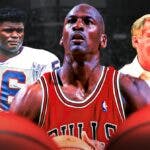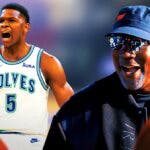Andrew Luck's decision to leave football behind rocked the sports world to its core, but the Indianapolis Colts quarterback is hardly the only athlete who stepped away from the game they once loved at the peak of their powers. These are the 10 most shocking retirements in the history of sports.
10. Sandy Koufax
The Brooklyn and Los Angeles Dodgers legend established himself as one of the most dominant pitchers of all time in the 1960s after his career initially got off to a slow start. Koufax won the 1963 National League MVP, three Cy Young Awards, and three pitchers' Triple Crowns in the early 1960s, leading the Dodgers to World Series victories in 1963 and 1965.
He called it quits after Los Angeles was swept by the Baltimore Orioles in the 1966 World Series, succumbing to arthritis-related pain at the age of 30.
9. Justine Henin
The pride of Belgium turned pro in 1999 at age 16, wasting little time to prove her worth as the next all-time great in women's tennis. Henin won her first Grand Slam, Wimbledon, in 2001, and won eight additional majors over the next six seasons – not including a gold medal at the 2004 Olympics in Athens.
She abruptly announced her retirement in May 2008 at 25-years-old despite retaining her grip on the world's No. 1 ranking, insisting she didn't “feel sadness” at her decision. Henin briefly returned to tennis in 2010, retiring for good shortly thereafter as she dealt with a debilitating elbow injury.
8. Calvin Johnson
“Megatron” lived up to his pre-draft hype coming out of Georgia Tech as one of the most physically-dominant wide receivers in the history of football. Johnson made the Pro Bowl every season from 2010 to 2015, and was named First Team All-Pro three seasons running over that timeframe.
His best season came in 2012, when he hauled in 122 catches for an NFL record 1,964 receiving yards. The Detroit Lions superstar announced his retirement in March 2016 at age 30, saying he was “fed up” with the toll football had taken on his body.
7. Ken Dryden
The Montreal Canadiens goaltender immediately became one of the most valuable players in the NHL after being called up from the minor leagues late in the 1971 season. Dryden's impressive play in relief of starter Rogie Vachon led to him retaining his job even once the All-Star was healthy, culminating in a Stanley Cup victory for Montreal and him winning Conn Smythe Trophy as the best player in the postseason.
That early success hardly proved an aberration for the 6-foot-4 goalie, who led the Canadiens to five more Stanley Cups before retiring in 1979 at 32. Dryden served in Canadian Parliament from 2004 to 2011 as a member of the Liberal Party.
6. Mark Spitz
The ultra-confident Spitz, just 18, predicted he would set a record for the number of gold medals won at any Olympics during the 1968 Games. But he left Mexico City with just two golds, both won in relays with Team USA, before enrolling at Indiana University and re-dedicating himself to the pool.
Spitz fulfilled his prior boast four years after his Olympic debut, winning a remarkable seven gold medals at the 1972 Games while setting an equal number of world records. He retired from swimming shortly after returning from Munich at 22-years-old, an age most swimmers begin their prime.
5. Bjorn Borg
The Swedish icon made his professional tennis debut in 1973, a year later becoming the youngest player to ever win the French Open at age 18. That triumph began one of the most impressive runs of success in the history of individual sports, as Borg won five more French Open titles and five consecutive Wimbledon championships from 1974 to 1981. The fame and adulation that accompanied his success weight on Borg, though, who announced his retirement in 1983 at 26-years-old due to burnout, which was at that time a new phenomenon in the sporting world.
4. Barry Sanders
There's never been another football player like Sanders, and there probably never will be. The Lions legend made the Pro Bowl and was named All-Pro in every season of his 10-year career, four times leading the NFL in rushing and in 1997 becoming just the third player ever to gain more than 2,000 yards on the ground.
That incredibly gaudy resumé of accolades and statistics was superseded by the eye test, as Sanders provided jaw-dropping highlights of jukes, broken tackles, and breakaway speed every time he stepped on the field. The notoriously introverted Sanders, then 30, hung it up in July 1999, announcing his playing days were over by faxing a statement to the Wichita Eagle, his hometown paper.
3. Jim Brown
Arguably the greatest player in NFL history, Brown's track record of success at its highest level is unmatched. He made the Pro Bowl in each of his nine seasons, and was named First Team All-Pro and led the league in rushing in every one of of those campaigns with the exception of 1962, when he settled for Second Team All-Pro.
The Cleveland Browns icon retired in 1966 as the NFL's all-time leading rusher, dedicating himself to a burgeoning acting career on a full-time basis.
“Showtime” wasn't quite over when Johnson stepped away from the game in November 1991 and announced he was HIV positive. The Los Angeles Lakers had fallen to Michael Jordan and the Chicago Bulls in the NBA Finals just a few months earlier, and Johnson, at 32, was showing little sign of being ready to relinquish his fading claim as the NBA's best player. He was at the height of his stardom, too, and so were irrational fears about the AIDS/HIV epidemic.
His retirement wasn't just heartbreaking for basketball fans, but scary for ill-informed Americans across the country. Johnson very briefly returned to the league in 1996, showing off the remarkable playmaking flair and natural court sense that made him a five-time champion and three-time MVP.
1. Michael Jordan
Jordan's shocking decision to leave basketball behind in the wake of his father's tragic death wasn't the last time we saw him on an NBA floor. But there was no way of knowing he'd eventually return to the game twice more after retiring, re-capturing the imagination of a growing global audience and further staking his claim as the greatest player in NBA history.
Where would Jordan rank in the league's individual hierarchy if he stuck with baseball? Thankfully, basketball fans around the world never needed to find out, as he won three of his six championship rings and Finals MVP awards after his initial retirement on October 6, 1993.




